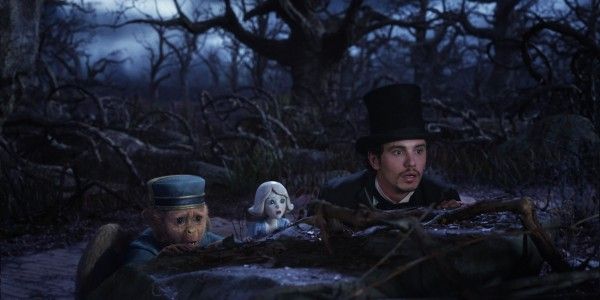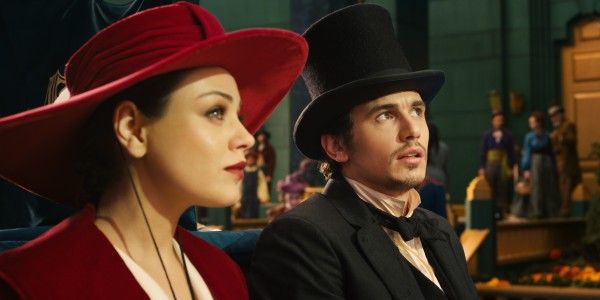We can find truth in deception. We find the deeper truth beneath the artifice. Sam Raimi's Oz the Great and Powerful makes no secrets of its deception, and shows how deception can be used for good or evil. We just don't call it deception when it's used for good. Then it's an illusion, not a trick.* Oz creates a beautiful illusion that we can get lost in not because of the visual effects wizardry or the size of the canvas, but because of the honesty of the characters and Raimi staying true to his oddball style.
Oscar "Oz" Diggs (James Franco) is a two-bit carnival magician who is at ease whether he's on stage manipulating an audience or if he's in his trailer manipulating a starry-eyed farm girl. When a twister comes barreling down on the carnival, Oscar hops in a hot air balloon, gets swept up in the cyclone, and awakens to find himself transported from black-and-white, Academy-ratio, 1905 Kansas to the bright, colorful, widescreen world of Oz (the film is 3D throughout). There he meets Theodora (Mila Kunis), who believes he's the prophesized wizard who will defeat the Wicked Witch and bring peace to the kingdom. The wealth and power that would come with such a victory pushes Oscar to play into the ruse, which also means toying with Theodora's heart. Also messing with Theodora is her crafty sister Evanora (Rachel Weisz), who sends Oscar out to kill the Wicked Witch. Along the way, he meets up with the helpful flying monkey Finley (voiced by Zach Braff), the sweet and innocent China Girl (voiced by Joey King), and the beautiful witch of the South, Glinda (Michelle Williams).
The story wisely takes its time before jumping into the adventure and the candy-colored visuals of Oz. We get to know who Oscar is, his strengths, his weaknesses, his hopes, his dreams, and rarely does it feel overbearing thanks to the fun tone and Franco's charming performance. The actor knows how to give a big, huckster grin, and while he's clearly having fun with the role, it never feels like he's chewing the scenery (and there's so much of it to chew). Raimi confidently gives the film a steady balance by having his characters ground the story so that the film doesn't get carried away in Robert Stromberg's lush production design and Peter Deming's eye-popping cinematography. But because we know who Oscar is, we're experiencing the wonder through his eyes rather than hearing Disney shout, "Look at how much money we spent!"
The 3D suits Raimi particularly well especially in the context of this film. Raimi's always played with an outlandish style that happily embraces B-movie charms like extreme close-ups, zoom shots, rushing cameras, and canted angles. The trick is not overdoing it, and Raimi exercises restraint with his trademarks to the point that when they are used, they're particularly effective. Like his film's protagonist, Raimi knows that it's not simply a matter of knowing a trick, but knowing when to use it.
We like tricks, but we don't like being fooled, and moving from the trickster to the magician is the enchanting journey of Oscar Diggs. He finds that in a magical land, a magician can be king, but it's not good enough to simply cheat the eye. The swindler will not suffice, and the consequences of his actions actually mean something. That's the investment we have in our desire to be fooled for the good of the larger truth. Oz the Great and Powerful thoughtfully explores the question of "What's the good in the art of deception?" Can there be such a thing as a selfless con man?
We'd like to think so when it comes to magic, but we have to be willing participants in the act, and not let our cynicism take hold (The Wizard of Oz begins with a title card that basically reads "Don't be cynical when watching this movie"). With a film like Oz the Great and Powerful, it has to earn our trust or else we'll see the green screen and the studio cash grab for inflated ticket sales from 3D. So it all comes back around to caring about the characters and the magician's charisma rather than the magic itself. It's a compelling journey to see a confidence man with a lack of confidence in his own greatness.
Furthermore, Mitchell Kapner and David Lindsay-Abaire's sharp script doesn't simply say, "Boy, it's great to be a sucker!" They take the time to show how Theodora is emotionally tormented by Oscar's careless deception and Evanora's cruel manipulation. Even though we care about Oscar's emotional transformation, Kunis' performance almost makes her character the melancholy heart of the picture, and once again, it's admirable to see the maturity Raimi brings to what could have been a hollow family flick.
An old-fashioned stage magician would be proud of how Raimi stages his big show except for one aspect: knowing when to make an exit. The filmmaker slightly overstays his welcome, and the film gets a little bogged in the extravagance it conjures. It's nice to see horses of a different color grazing in the background, but we don't need to see munchkins starting in on a musical number (even though it does get a funny reaction from Oscar). Sometimes, it's best to say "Thank you, and good night!"
The film may not know when to exit stage left, but the act succeeds because it relishes the performance. Whether it's coming from the human actors or their charming CGI companions like China Girl, who's adorable without ever coming off as cloying, Raimi knows that we have to care about the characters or else all the effects are worthless. We want to be fooled. We want the illusion. We wanted it back in 1939 with The Wizard of Oz and we want it today. Oz the Great and Powerful may not be magical, but neither was the wizard. He just knew how to put on a good show.
Rating: B+
*As the great wizard Gob Bluth once said, "Tricks are what a whore does for money…or cocaine."



